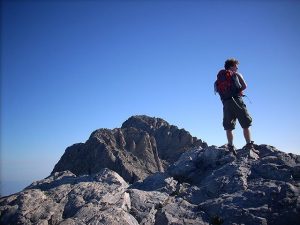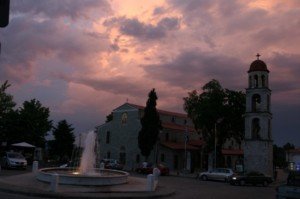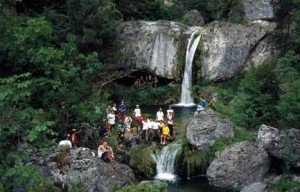Mount Olympus
 Mount Olympus (Greek: Όλυμπος ; also transliterated as Ólympos, and on Greek maps, Óros Ólimbos) is the highest mountain in Greece, located on the border between Thessaly and Macedonia, about 100 kilometres (62 mi) away from Thessaloniki, Greece’s second largest city. Mount Olympus has 52 peaks.[2] The highest peak Mýtikas, meaning “nose”, rises to 2,917 metres (9,570 ft). It is one of the highest peaks in Europe in terms of topographic prominence.
Mount Olympus (Greek: Όλυμπος ; also transliterated as Ólympos, and on Greek maps, Óros Ólimbos) is the highest mountain in Greece, located on the border between Thessaly and Macedonia, about 100 kilometres (62 mi) away from Thessaloniki, Greece’s second largest city. Mount Olympus has 52 peaks.[2] The highest peak Mýtikas, meaning “nose”, rises to 2,917 metres (9,570 ft). It is one of the highest peaks in Europe in terms of topographic prominence.
Mount Olympus is noted for its very rich flora with several endemic species.
In Greek mythology the mountain was regarded as the “home of the gods”, specifically of the Twelve Olympians, the twelve principal gods of the Classical Greek and Hellenistic worlds.Climbing
Olympus’ highest peak, Mýtikas or the “Throne of Zeus” Mount Olympus with Stefani Peak (2009m) and Mytikas peak behind it – view from Olympic Beach of Katerini.
Climbing Mount Olympus is a non-technical hike, except for the final section from Skala summit to Mitikas summit,  which is YDS class 3 rock scramble. It is estimated that 10,000 people climb Mount Olympus each year, most of them reaching only the Skolio summit. Most climbs to Mount Olympus start from the town of Litochoro, which took the name City of Gods because of its location on the roots of the mountain. From there a road goes to Prionia, where the hike begins at the bottom of the mountain.
which is YDS class 3 rock scramble. It is estimated that 10,000 people climb Mount Olympus each year, most of them reaching only the Skolio summit. Most climbs to Mount Olympus start from the town of Litochoro, which took the name City of Gods because of its location on the roots of the mountain. From there a road goes to Prionia, where the hike begins at the bottom of the mountain.
Coin
Mount Olympus and the national Park around it were recently selected as the main motif for a high value euro collectors’ coin: the €10 Greek National Park Olympus commemorative coin, minted in 2005. On the reverse, the War of the Titans on Mount Olympus is portrayed along with flowering branches on the lower part of the coin. Above the scene is written, in Greek, “National Park Olympus”, while on the bottom of the coin, close to the edge, is the issuing year.
Traditionally regarded as the heavenly abode of the Greek gods and the site of the throne of Zeus, Olympos seems to have originally existed as an idealized mountain that only later came to be associated with a specific peak. The early epics, the Illiad and the Odyssey (composed by Homer around 700BC) offer little information regarding the geo graphic location of the heavenly mountain and there are several peaks in Greece, Turkey and Cyprus that bear the name Olympus. The most favored mythological choice is the tallest mountain range in Greece, the Olympus massif, 100 kilometers southwest of the city of Thessaloniki in northern Greece. The highest peak – shown in the photograph – is Mytikas at 2918 meters (9570 feet).
graphic location of the heavenly mountain and there are several peaks in Greece, Turkey and Cyprus that bear the name Olympus. The most favored mythological choice is the tallest mountain range in Greece, the Olympus massif, 100 kilometers southwest of the city of Thessaloniki in northern Greece. The highest peak – shown in the photograph – is Mytikas at 2918 meters (9570 feet).
The deities believed to have swelled upon the mythic mount were Zeus, the king of the gods; his wife Hera; his brothers Poseidon and Hades; his sisters Demeter and Hestia; and his children, Apollo, Artemis, Ares, Aphrodite, Athena, Hermes and Hephaestus. It is interesting to note that these Olympian gods and goddesses were understood in ancient times as archetypes representing idealized aspects of the multi-faceted human psyche. Worship of the deities was a method of invoking and amplifying those aspects in the behavior and personality of the human worshiper. Zeus was the god of mind and the intellect, and a protector of strangers and the sanctity of oaths; Hera was a goddess of fertility, the stages of a woman’s life and marriage; Apollo represented law and order, and the principles of moderation in moral, social and intellectual matters; Aphrodite was a goddess of love and the overwhelming passions that drove humans to irrational behavior; Hermes was the god of travelers, of sleep and dreams and prophecy; Athena was spiritual wisdom incarnate; Hephaestus was the god of the arts and fire; and Ares represented the dark, bloodthirsty aspect of human nature.
These gods and goddesses did not actually live upon Olympus, rather the ancient myth can be understood to be a  metaphor for the power of the sacred mountain. This spiritual power had drawn hermits and monks to live in the caves and forests of the mountain since long before the dawn of the Christian era. With the coming of Christianity the myths and legends of the old Greeks were suppressed and forgotten, and the holy mountain was seldom visited. Today, weekend hikers and young travelers on the vagabond trail through Europe dash up and down the peak in a single day. It is certainly a beautiful place for such a hasty hike, yet to draw upon the real magic of Olympus one should come as a pilgrim and remain for a few quiet days in the woods.
metaphor for the power of the sacred mountain. This spiritual power had drawn hermits and monks to live in the caves and forests of the mountain since long before the dawn of the Christian era. With the coming of Christianity the myths and legends of the old Greeks were suppressed and forgotten, and the holy mountain was seldom visited. Today, weekend hikers and young travelers on the vagabond trail through Europe dash up and down the peak in a single day. It is certainly a beautiful place for such a hasty hike, yet to draw upon the real magic of Olympus one should come as a pilgrim and remain for a few quiet days in the woods.
